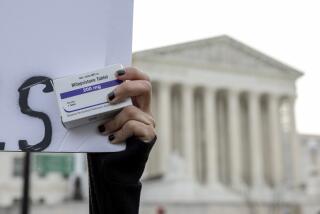New Patent Extension Law Needs Safeguards
- Share via
The new patent extension law, passed by both houses of Congress and signed by the President in September, has been heralded as the most significant piece of drug legislation since the 1962 Kefauver amendments to the Food, Drug and Cosmetic Act. Those amendments increased the requirements for proof of safety and effectiveness in new drugs. They came about because of a courageous woman scientist at the FDA who held up marketing approval of the sedative thalidomide which she suspected caused possible birth defects if used by pregnant women. She was proven tragically correct when it was discovered that children, born of mothers who had taken the drug in Europe where it had been marketed, had no arms or legs, a condition known as phocomelia.
The 1984 legislation grants major drug manufacturers a guarantee of at least five years marketing exclusivity to make up for the long time required to have a drug approved by the FDA.
As soon as the added patent protection time has elapsed, generic drug manufacturers will be able to market copies of the brand-name drug, as long as such copies are the chemical equivalent and with the same release time in the blood stream.
Sounds Wonderful This new law will give the brand-name manufacturers continued incentive to research and develop new drugs, while allowing the generic drug makers to market less expensive drugs of the same chemical equivalent without going through the rigorous testing required of the original brand-name drug.
It all sounds wonderful. The brand-name manufacturers are getting what they want, extension of patent time, and the generic manufacturers will be able to market copies which will come to the consumer at less cost.
The House Committee on Government Operations, investigating infant deaths linked to the drug E-Ferol which was marketed without FDA approval, has recommended that such approval be indicated on the label. If there had been such a law, the pharmacists who had received the drug would have known immediately that it was not an FDA-approved product, and it might not have been dispensed for several premature infants who subsequently died.
Equivalency Is Not Enough As for generic drugs, there is no objection as long as they are safe and effective. But chemical equivalency is not enough. The drug should pass the same stringent safety tests as brand-name drugs. The new patent extension law does not contain the provision for indication that the drug has been approved by the FDA. New legislation would be required to give the consumer this needed safeguard, assuring that the drug product is safe.
Ideally, such a law would also require the pharmacist to indicate the FDA approval on the label when the prescription is filled or refilled.
Question: I had a case of food poisoning about four years ago and since that time I have to take Benadryl every day for hives. Even with the Benadryl I sometimes end up in the emergency room for shots just to reduce the excess swelling. I have been tested for everything and I am sensitive to just about everything. I don’t know what to do or where to go for help?
Answer: It is difficult to ascertain the cause of chronic hives. All things are suspect such as the nonprescription drugs you may be taking, dyes found in food, and underlying infections of which you may not be aware such as a simple infected tooth. You live in an area with some of the best research hospitals in the country--Chicago. Call the chief of the allergy department at one of these hospitals and explain your problem. I am confident you will be studied and given relief from these chronic hives.
Q: My son takes Tolectin for arthritis and I take Nalfon. What side effects do these drugs have?
A: Nausea, stomach and intestinal problems are the most reported side effects of these drugs.
Q: Nilstat liquid has been prescribed for my baby because of an infection in her mouth. What is it?
A: Nilstat is a brand name for the antibiotic nystatin. This antibiotic has anti-fungal activity and is indicated in the treatment of oral infections caused by monilia (yeast). It is prescribed for infants who have what used to be called thrush.
Q: I recently had a cold which left me with a bothersome cough. The doctor prescribed Hycodan syrup, and it stopped the cough. When I stopped taking it, the cough came back. The pharmacist told me I would have to see my doctor for another prescription. Why is this? I just wanted a refill of the medicine and do not see why I should pay $30 to see my doctor again just to get a prescription.
A: Hycodan is a brand name for a tablet or syrup containing hydrocodone, which is a derivative of the narcotic codeine. The law states that your pharmacist cannot refill this prescription. This is the reason you were requested to see your doctor for another prescription. Usually a telephone call to your doctor will give you the information as to whether or not your doctor wants you to have a refill or if he wants you to stop taking the medication.
More to Read
Get the L.A. Times Politics newsletter
Deeply reported insights into legislation, politics and policy from Sacramento, Washington and beyond. In your inbox twice per week.
You may occasionally receive promotional content from the Los Angeles Times.










